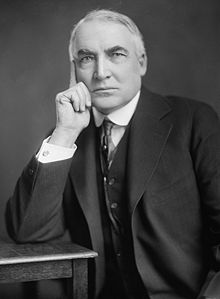
"Return to normalcy" was a campaign slogan used by Warren G. Harding during the 1920 United States presidential election. Harding won the election with 60.4% of the popular vote.
1920 election
In a speech delivered on May 14, 1920, Harding proclaimed that America needed "not nostrums, but normalcy". [1] Two months later, during a homecoming speech, Harding reaffirmed his endorsement of "normal times and a return to normalcy." [2]
World War I and the Spanish flu had upended life, and Harding said that it altered the perspective of humanity. He argued that the solution was to seek normalcy by restoring life to how it was before the war. [3] Harding's conception of normalcy for the 1920s included deregulation, civic engagement, and isolationism. [3] He rejected the idealism of Woodrow Wilson and the activism of Roosevelt, favoring the earlier isolationist policy of the United States. [4]
Detractors of the time tried to belittle the word "normalcy" as a neologism as well as a malapropism, saying that it was poorly coined by Harding, as opposed to the more accepted term normality. There was contemporaneous discussion and evidence that normalcy had been listed in dictionaries as far back as 1857. [5] According to some historians, normalcy was an "obscure math term" before its use by Harding [6] during the campaign. Harding, a newspaper editor, addressed the issue of the word's origin, claiming that normalcy but not normality appeared in his dictionary. [7]
Harding prominently featured his dog Laddie Boy to the press to instill the domestic image associated with his vision of normalcy. [8]
Harding's position attracted support during the 1920 presidential election, winning 60.3% of the popular vote. [9]
Other usage
Chalmers M. Roberts of The Washington Post compared the desire for a "return to normalcy" in 1920 to the 1946 midterms following World War II and the 1992 presidential election following the Cold War. [10]
The 12th episode of Boardwalk Empire takes place during the 1920 election and is titled " A Return to Normalcy".
The phrase "return to normalcy" became associated with the 2020 presidential campaign of Joe Biden, specifically referring to Biden's promises to end the "divisiveness of the Trump years," as well as his campaign's focus on tackling the COVID-19 pandemic in the United States. [11]
See also
- New normal, also concerned with trying to emerge from abnormal periods
- Presidency of Warren G. Harding
- Make America Great Again
References
- ^ "Return to Normalcy". teachingamericanhistory.org. Archived from the original on October 3, 2006.
- ^ Curzan, Anne (2014). Fixing English: Prescriptivism and Language History. University of Cambridge: Cambridge University Press. p. 107. ISBN 9781139952286.
- ^ a b Deverell, William (May 19, 2020). "Warren Harding Tried to Return America to 'Normalcy' After WWI and the 1918 Pandemic. It failed". Smithsonian Magazine. Retrieved April 5, 2022.
- ^ "Presidential Election of 1920". Library of Congress. Retrieved April 5, 2022.
- ^ "The Mavens' Word of the Day: normalcy". randomhouse.com. June 25, 1999. Archived from the original on June 18, 2006.
- ^ Beat, Matt (July 14, 2020). Mr. Beat presents...The Ultimate American Presidential Election Book: Every Presidential Election in American History. Independently published. ISBN 979-8-7066-9491-3.
- ^ Kory Stamper (October 29, 2013). "Obama didn't use improper grammar. Cut him and other public figures a break". The Guardian. Retrieved February 23, 2014.
- ^ Pycior, Helena (2005). "The Making of the "First Dog": President Warren G. Harding and Laddie Boy". Society & Animals. 13 (2): 113. doi: 10.1163/1568530054300190. ISSN 1063-1119.
- ^ "Election of 1920: Republican and the Return to Normalcy". www.u-s-history.com.
- ^ Roberts, Chalmers M. (November 16, 1994). "RETURN TO 'NORMALCY' -- AGAIN". Washington Post. ISSN 0190-8286. Retrieved April 5, 2022.
- ^ Klein, Ezra (May 20, 2019). "Joe Biden's promise: a return to normalcy". Vox. Archived from the original on January 16, 2021. Retrieved September 15, 2020.
External links
- "Normalcy", The New Dictionary of Cultural Literacy, 3rd ed., edited by E. D. Hirsch, Jr., et al. Boston: Houghton Mifflin, 2002. ISBN 0-618-22647-8.
- "A Time for Normalcy" by Evan Jenkins, Columbia Journalism Review, January/February 2002.